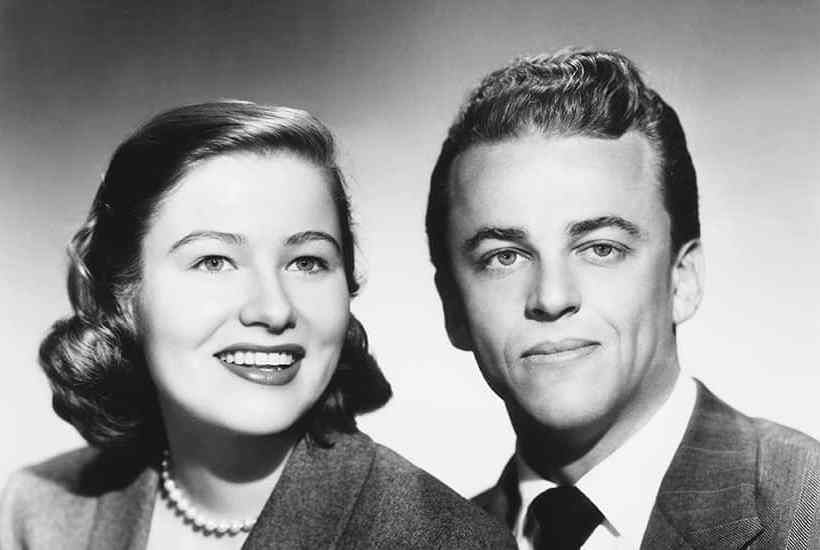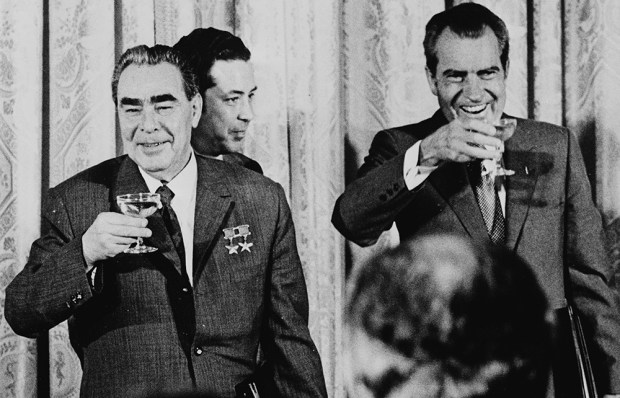Nostalgia barged in like gangbusters. What brought it on was a brief article about the most charming and enchanting of young women, Nancy Olson. Seventy-two years ago, she was in that rare gem of a movie, Sunset Boulevard, playing the rosy-cheeked screenwriter who was the love interest of William Holden, the writer who was handsome but entrapped by Norma Desmond, aka Gloria Swanson. Nancy’s blue eyes shimmered, and her figure was to die for, but what made her memorable was that she was as American as apple pie. Innocence trumped sex in her case, and apparently she was as decent and as intelligent as the ingénue she played in that film. She quit the movies early on because it was too narrow a life. She’s now 94 and has written a book – and I for one can’t wait to read it. Alas I never met her and I won’t feature in it because she was the third wife of a very great man with whom I spent an unforgettable evening when he was on his fifth or sixth marriage, the final tally being eight.
JFK was assassinated on 22 November 1963, but earlier that summer, on the Riviera, I had met Jackie Kennedy’s sister Lee and her Polish husband Prince Radziwill as we were both staying in Gianni Agnelli’s Villefranche villa. Lee was prettier and more feminine than Jackie, and rather flirtatious. Jackie’s love of fashion and the arts, following the blandness of the Eisenhower years, had Washington in a tizzy. The capital had caught the ‘society bacillus’. Film stars, poets, writers and socialites had turned the White House into a glamorous non-stop party, or so it seemed. Stas and Lee figured prominently in all the action. Then came the assassination and Jackie assumed the role of martyred goddess. She soon moved to New York, while the Radziwill domestic Sturm und Drang became an open secret.
When Stas returned to London, where he lived, Lee stayed behind to be close to Jackie. I was in my early twenties and Lee in her late twenties. We began hanging out, as they say nowadays. El Morocco was a nightly ritual for me back then, and on that particular evening Lee and I were seated on the banquette reserved for a privileged few, next to another couple who smiled at us as we sat down. Unlike the studied detachment practised by so-called celebrities today, the gentleman next to us, who oozed cosmopolitan sophistication, asked me how I got the black eye I was sporting. I told him it was from a right cross while boxing, and he said that it was flicky left jabs that did the real damage. He then introduced himself as Alan Lerner and his companion as his wife.
Well, I had the good luck to grow up during the golden age of American popular song, which began with the musical Show Boat and lasted until the rise of rock in the late 1960s. Alan Lerner was a hero librettist of mine, with hits such as An American in Paris, Paint Your Wagon, Brigadoon, Gigi, My Fair Lady (the libretto was superior to GBS’s Pygmalion, which the musical was based on), Camelot, Royal Wedding, Oscar-winning screenplays and what have you. Both Lee and I were awestruck. Then, after a few drinks, he asked us to go back to his flat at the Pierre to listen to something he was working on.
The Pierre was next to the Sherry Netherland, where I grew up, so off we went to his penthouse and Alan hit the piano. ‘I’m thinking of calling this “On a Clear Day You Can See Forever”,’ he said, and sang it at the piano with a wonderful clean voice, asking us what we thought. We both tripped over our adjectives in showy adulation. He asked me to go with him into the next room. I followed and he said: ‘You’re a nice-looking young man, boxing is too brutal a sport.’ He then gently took out his glass eye. ‘I got this boxing,’ he said, and just as gently put it back in. We went back to the drawing room and heard more songs. The evening finished at around 5 a.m. and I never met Alan Lerner again. But I remember the night as if it were yesterday: his gentleness, friendliness and incredible talent. I now read that he was married eight times, and Nancy Olson, the love of my life who I never met, was his third.
Both Alan and Lee are now gone, but Alan’s music will always be with us. Lee and I stayed friends until the end, although she remained unsatisfied after three failed marriages. Her problem was, I believe, Jackie. Unlike her older sibling, docility to a man was not Lee’s strong point. Her artistic ambitions remained beyond reach, although encouraged by false friends such as Truman Capote, who wanted control. She tried acting and writing but remained known as the younger sister of the great Jackie. Certain humiliations followed a couple of television plays in which she starred, but she remained undaunted till the end.
Perhaps I’m being unfair, but Lee’s underlying indifference to anything beyond her immediate concerns prompted the loss of the love of many. But we forget that in those days women of her background had a limited range of marital and vocational possibilities. Perhaps that’s why both of us were so open-mouthed with admiration in the face of the genius of Alan Jay Lerner that memorable night.
Got something to add? Join the discussion and comment below.
Get 10 issues for just $10
Subscribe to The Spectator Australia today for the next 10 magazine issues, plus full online access, for just $10.
Jeremy Clarke is away.
You might disagree with half of it, but you’ll enjoy reading all of it. Try your first month for free, then just $2 a week for the remainder of your first year.















Comments
Don't miss out
Join the conversation with other Spectator Australia readers. Subscribe to leave a comment.
SUBSCRIBEAlready a subscriber? Log in